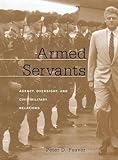Armed Servants : Agency, Oversight, and Civil-Military Relations / Peter D. Feaver.
Material type: TextPublisher: Cambridge, MA : Harvard University Press, [2009]Copyright date: ©2005Description: 1 online resource (400 p.)Content type:
TextPublisher: Cambridge, MA : Harvard University Press, [2009]Copyright date: ©2005Description: 1 online resource (400 p.)Content type: - 9780674036772
- 322.50973
- JK330 -- F43 2003eb
- online - DeGruyter
| Item type | Current library | Call number | URL | Status | Notes | Barcode | |
|---|---|---|---|---|---|---|---|
 eBook
eBook
|
Biblioteca "Angelicum" Pont. Univ. S.Tommaso d'Aquino Nuvola online | online - DeGruyter (Browse shelf(Opens below)) | Online access | Not for loan (Accesso limitato) | Accesso per gli utenti autorizzati / Access for authorized users | (dgr)9780674036772 |
Browsing Biblioteca "Angelicum" Pont. Univ. S.Tommaso d'Aquino shelves, Shelving location: Nuvola online Close shelf browser (Hides shelf browser)

|

|

|

|

|

|

|
||
| online - DeGruyter On Zion's Mount : Mormons, Indians, and the American Landscape / | online - DeGruyter The Gardens of Emily Dickinson / | online - DeGruyter Organizing Control : August Thyssen and the Construction of German Corporate Management / | online - DeGruyter Armed Servants : Agency, Oversight, and Civil-Military Relations / | online - DeGruyter Unfiltered : Conflicts over Tobacco Policy and Public Health / | online - DeGruyter The Gender of Modernity / | online - DeGruyter Reading the Early Republic / |
Frontmatter -- Contents -- Preface -- CHAPTER 1. Introduction -- CHAPTER 2. Huntington’s Cold War Puzzle -- CHAPTER 3. The Informal Agency Theory -- CHAPTER 4. A Formal Agency Model of Civil-Military Relations -- CHAPTER 5. An Agency Theory Solution to the Cold War Puzzle -- CHAPTER 6. Explaining the Post–Cold War “Crisis,” 1990–2000 -- CHAPTER 7. Using Agency Theory to Explore the Use of Force in the Post–Cold War Era -- CHAPTER 8. Conclusion -- Notes -- References -- Index
restricted access online access with authorization star
http://purl.org/coar/access_right/c_16ec
How do civilians control the military? In the wake of September 11, the renewed presence of national security in everyday life has made this question all the more pressing. In this book, Peter Feaver proposes an ambitious new theory that treats civil-military relations as a principal-agent relationship, with the civilian executive monitoring the actions of military agents, the "armed servants" of the nation-state. Military obedience is not automatic but depends on strategic calculations of whether civilians will catch and punish misbehavior. This model challenges Samuel Huntington's professionalism-based model of civil-military relations, and provides an innovative way of making sense of the U.S. Cold War and post-Cold War experience--especially the distinctively stormy civil-military relations of the Clinton era. In the decade after the Cold War ended, civilians and the military had a variety of run-ins over whether and how to use military force. These episodes, as interpreted by agency theory, contradict the conventional wisdom that civil-military relations matter only if there is risk of a coup. On the contrary, military professionalism does not by itself ensure unchallenged civilian authority. As Feaver argues, agency theory offers the best foundation for thinking about relations between military and civilian leaders, now and in the future.
Mode of access: Internet via World Wide Web.
In English.
Description based on online resource; title from PDF title page (publisher's Web site, viewed 30. Aug 2021)


